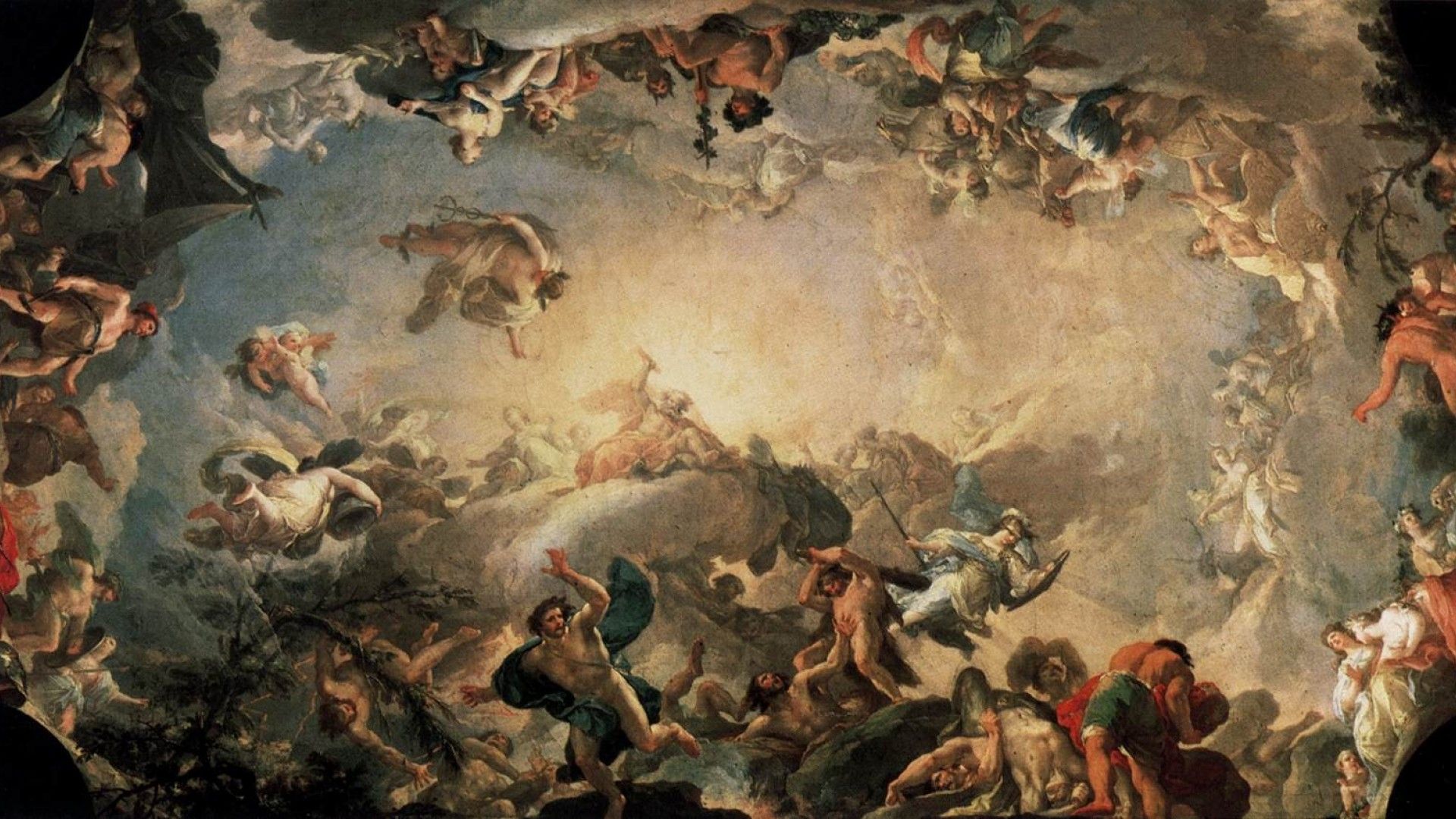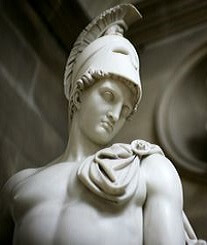
Ares

God of War
The ancient Greek god of war Ares (Roman name: Mars) was perhaps the most unpopular of all the Olympian gods because of his quick temper, aggressiveness, and unquenchable thirst for conflict.
Described by Hesiod as "shield-piercing Ares" and "city-sacking Ares", the god represented the more brutal and bloody side of battle - in contrast to Athena, who represented the more strategic elements of warfare. In mythology, Ares was usually to be found in the company of his children with Aphrodite, Phobos (Fear) and Deimos (Terror), with his sister Eris (Strife), and with his charioteer Ennyo.
Son of Zeus and Hera, Ares' sisters were Hebe and Eileithyia. He had various children with different partners, several of whom were unfortunate enough to come up against Hercules when he performed his celebrated labours. Ares' daughter Hippolyta, the Amazon queen, lost her girdle to Hercules, his son Eurytion lost his cattle, and Diomedes had his horses stolen by the Greek hero. The courageous but war-like Amazons were also thought to be descendants of Ares.
Ares was noted for his beauty and courage, qualities which no doubt helped him win the affections of Aphrodite (even though she was married to Hephaistos) and with whom he had a daughter, Harmonia. As punishment for his indiscretion, Ares was temporarily banished from Mount Olympus. He also upset the harmony of Olympus when he was accused of killing Poseidon's son Halirrhothios near a stream below the Athenian acropolis.
A special court was convened - the Areopagos - on a hill near the stream, to hear the case. Ares was acquitted as it was disclosed Halirrhothios had raped Ares' daughter Alkippe. Thereafter in Athens, the Areopagus became the place of trial for cases involving murder and impiety.
Perhaps unsurprisingly, considering the city's strong militaristic culture, Ares was greatly esteemed in Sparta. He also had a cult in Thrace and was popular among the Colchians on the Black Sea.
The most popular myth involving Ares was his fight with Hercules. Ares' son Kyknos was infamous for waylaying pilgrims on their way to the oracle at Delphi, and so earned the displeasure of Apollo who sent Hercules to deal with him. Hercules killed Kyknos and a furious Ares engaged the hero in a fight.
However, Hercules was protected from harm by Athena and even managed to wound Ares. Another myth and ignominious episode for Ares was his capture by the twin Giants Ephialtes and Otus when they stormed Mount Olympus. They imprisoned the god in a bronze jar (or cauldron) for one year and he was only freed through the intervention of Hermes.
In Homer's version of the Trojan War in the Iliad, Ares supports the Trojans, sometimes even leading them in battle along with Hektor. The Iliad shows Ares in a less than positive light and he is described as "hateful Ares", "the man-killer", "the war-glutton", and the "curse of men". Homer's picture of Ares, like the above mythological tales, also often demonstrates his weakness in comparison to the other gods.
Ares is roundly beaten by Athena who, supporting the Achaeans, knocks him out with a large rock. He also comes off worse against the Achaean hero Diomedes who manages to injure the god with his spear, albeit with the help of Athena. Homer describes the scream of the wounded Ares as like the shouts of 10,000 men. Fleeing back to Olympus, Zeus ignores the complaints of Ares but instructs Paiёon to heal his wound.
In ancient Greek Archaic and Classical art, Ares is most often depicted wearing full armour and helmet and carrying a shield and spear. In this respect he may appear indistinguishable from any other armed warrior. Sometimes he is shown riding his chariot pulled by fire-breathing horses. The myth of Ares' battle with Hercules was a popular subject for Attic vases in the 6th century BCE.
In later times, the Roman god Mars was given many of the attributes of Ares, although, as was typical of the Roman view of the gods, with less human qualities. In Roman mythology, Mars was also the father of Romulus and Remus (through the rape of the Vestal Virgin Rhea Silvia), the legendary founders of Rome, and therefore the city achieved a sacred status. Like Athena for Athens, Mars was also patron god of the Roman capital and the month martius (March) was named after him.
His animal is the dog.
[1]
Abducted by Aloadae giants
Ares was the son of Zeus and Hera. Unloved by his father and preoccupied mother, he was forced to live under his own guidance at Mount Olympus. He one day went missing in his quest to protect his home and the kingdom of gods. No one really cared about it and it later turned out that he had been abducted by twin Aloadae giants who wanted to destroy the gods. Young Ares was imprisoned in a bronze jar for thirteen months, until the mother of the giants found out about their hostile behaviour and informed Hermes who came to rescue and freed him from the clasps of the giants.
Affair with Aphrodite
During his time at Mount Olympus, he was involved in adultery with Aphrodite, a wife of Hephaestus, who was also a resident there. Helios once spied on the couple and told Hephaestus about this affair. The angry husband made a special net and trapped them, while they were in very intimate position. Then he invited other gods to see them. As a result of this act and continuous tension between the gods, Ares was banished from Olympus. He found refuge in Thrace, his birthplace.
Rescuing Thanatos
Thanatos, the personification of death was imprisoned by king Sisyphus, after the king had tricked the death into handcuffing himself. Sisyphus held Thanatos as captive for over a month, before Ares, bored with life and wars of the Greeks, decided to rescue him.
He went before the king and threatened with decapitating him, if he would not release Thanatos and turn himself into Hades' prisoner. Sisyphus in fear of the wrath of Ares, freed Thanatos and turned himself in, but later Hades, on the advice of Persephone, released him from the underworld after Merope, the wife of Sisyphus, on his orders threw his naked body into the middle of the public square. He convinced Persephone that he wants to scold his wife for not burying his body and giving it a proper funeral.
When released, he scolded his wife, but had no plan of returning back to the underworld. As a punishment for his trickery, Zeus sent Sisyphus to Tartarus and made him roll a huge boulder up a steep hill for eternity. Before he could reach the top, the massive stone would always roll back down, forcing him to begin again.
Trojan war
Ares was also heavily involved in Trojan war. When the war started, he promised his mother Hera and half sister Athena that he will fight for the Greeks. However, he was persuaded by his lover Aphrodite who had her heart with the trojans, mostly because of Paris.
He had broken his promise and took allegiance with the Trojans. He was also noted in Homer's Iliad to be leading the Trojans to the battlefield, accompanied with sons Phobos and Deimos and his sister Eris. He was, like many gods, wounded in the battlefield by Diomedes and Athena. They were on a chariot which was on way to collision with Ares.
But Ares only saw Diomedes, because Athena was wearing the helm of darkness. Ares threw a spear towards Diomedes which was intercepted by Athena. And it was Diomedes` turn to throw his spear. Guided by Athena, it hit Ares in the stomach, causing him so much pain that he had to withdraw from the battle. Ares also lost a son in a war, called Ascalaphus. At that time all the gods were ordered by Zeus to be withdrawn from the battle. Despite orders from the king, Ares in his rage wanted to avenge his son, but was restrained by Athena.
[2]
Source
[1] "Ancient History Encyclopedia"
[2] "Greek Gods"
Our Mobile Application
Check out Our Mobile Application "Ancient Greece Reloaded"


